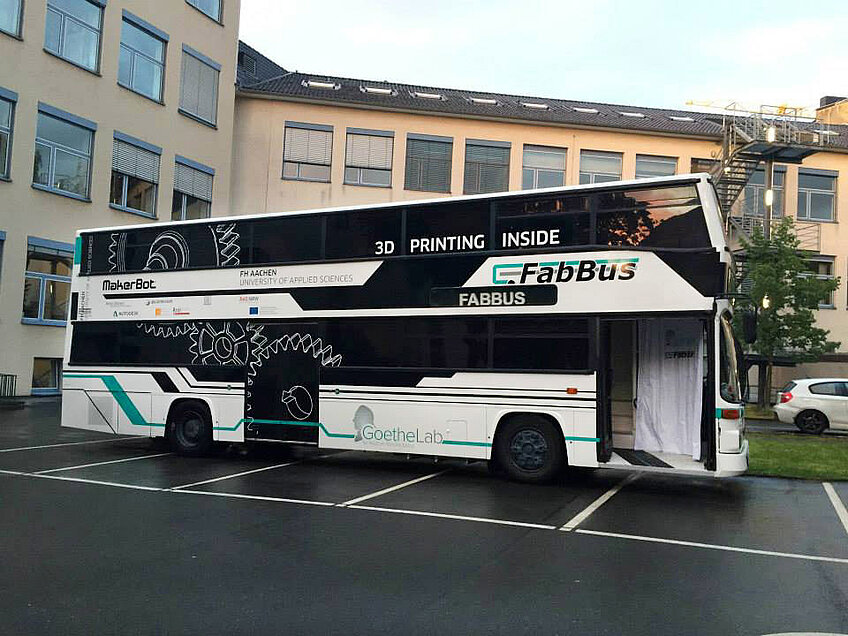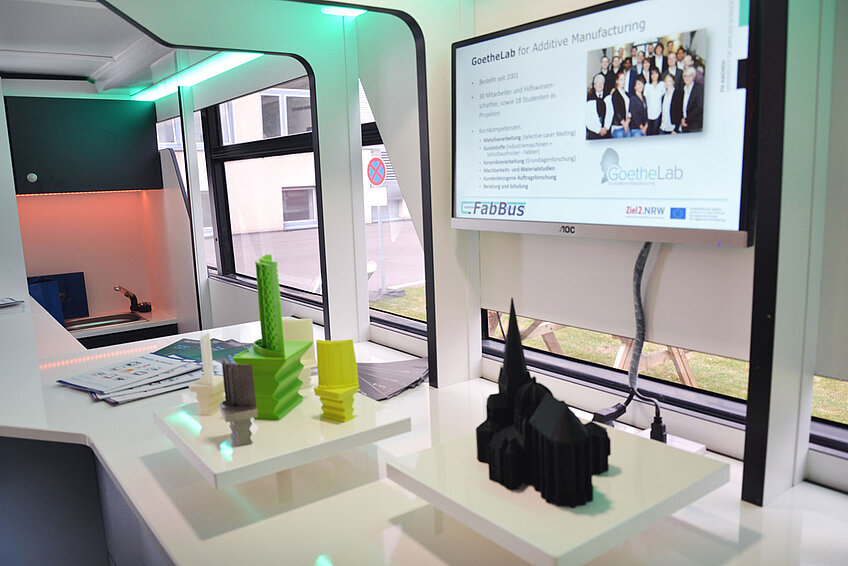
(picture: FH Aachen, Magdalena Kandzia)

(picture: FH Aachen, Magdalena Kandzia)
Concentrated technology in the mobile lab: This is how you could sum up GoetheLab's FabBus. After two years of planning, the double decker bus of the Faculty of Mechanical Engineering and Mechatronics at the FH Aachen University of Applied Sciences, is now ready for its big launch. The project's vision: To take 3D printing from the science labs directly to the potential new blood and make it tangible for them. Recently, the FabBus was ceremoniously christened and introduced to the public for the very first time.
The lab is located in Goethestraße, so it's perfectly clear that the huge vehicle is also named after this great writer. The bus called "Wolfgang" has a mission. "If the new blood does not come to us, we'll go to them", Prof. Dr. Andreas Gebhardt, Dean of the Faculty of Mechanical Engineering and Mechatronics, and Head of Teaching, explains the plan. For years, the GoetheLab has been conducting seminars in its own laboratories as well as schools and educational establishments. Packing and unpacking the lab equipment is always very time consuming. "About two years ago, we had the idea to set up a lab on wheels", Prof. Gebhardt says. It had to be something big - and so a double decker bus was purchased in Berlin in order to turn the vision into reality. In 2014, the reconstruction was given the go-ahead. Since then, the giant, 11 metres in length and 4 metres in height, has undergone a metamorphosis. The bus was restored and reconstructed for four months, during six further months a carpentry took on the completion of the interior. The great amount of work and the huge commitment of the project supervisors Laura Thurn and Julia Kessler as well as the GoetheLab staff members Mirjam Knothe, Steffen Stahlhacke and Michael Weiß have paid off: The former sightseeing bus has turned into a futuristic mobile lab. This way, they can now drive up to businesses, schools and job-related institutions directly, in order to introduce them to the latest technology of additive manufacturing processes.
"An outstanding achievement by the Faculty of Mechanical Engineering and Mechatronics", is FH Rector Prof. Dr. Marcus Baumann's assessment. "Here, science and technology are visualised and can be experienced first hand by everyone, which is great," the Rector continues. Especially when it comes to engineering sciences, it's never easy to convey contents in an easily understandable and viewable manner. This is why first-hand experience and DIY take centre stage in the FabBus. Altogether eleven 3D printers await their employment. The front area of the lower floor serves as a showroom, here component parts of all 3D printing procedures are displayed and the procedure itself is explained. The back of the bus, complete with a coffee bar and a lounge area, invites people to watch the 3D printing procedures or browse one of the specialist books. The upper floor serves as a training room with eight
workstations which are each equipped with a 3D printer and a computer. There is enough space for sixteens pupils or eight adults to attend seminars.
Wolfgang's maiden voyage will start as early as next week. In the mobile lab, the team lead by Prof. Gebhardt will reveal to the interested public how 3D printing works and how a scan eventually becomes a 3D component part for the first time.
The project is supported by the European Regional Development Fund (ERDF). The ERDF funds are co-financed by the federal government, by state governments, by local government authorities and other public institutions, as well as private investors. Under the slogan "Investition in unsere Zukunft" (Investing in Our Future), it is the ERDF's objective to lower economic and social differences in the European Union and to reduce inequalities between the individual regions.
More information on the FabBus can be found online under www.fabbus.fh-aachen.de.
2024 © HAWtech ContactPrivacy PolicyLegal NoteLogin